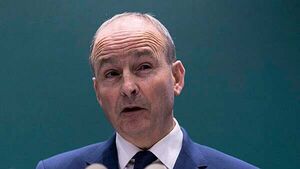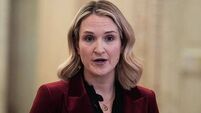Child poverty to be prioritised in Budget 2026 - Taoiseach

Vivienne Clarke
Taoiseach Micheál Martin has said that child poverty will be prioritised in the forthcoming budget.
“I think you are looking at significant moves in terms of child support payment and in terms the working family payment, but also the development of a second-tier payment.
"But the Department of Social Protection are saying clearly to us, they're not yet in a position to develop such a payment, but that they will focus, obviously, and bring to government recommendations, which will be decided by three party leaders and the ministers for finance and public expenditure, along with social protection on issues to support low income families," he said.
"Particularly through the child support payment and the working family payment and other measures that will be designed to target resources at those who are facing the greatest impact in terms of an undoubted cost of living situation, particularly in terms of cost of food and so forth,” he told RTÉ radio’s Morning Ireland.
“So that it will be a focus, particularly in terms of any income supports we can enhance for families with children with disabilities and for people generally who have a disability and then of course the broader issue of the carers allowance.”
Mr Martin said that in the aftermath of the Covid-19 pandemic and the war in Ukraine, inflation had spiked “very, very” significantly, which had to be dealt with through targeted measures “to bring those figures down.”
“We acknowledge the reality of where the figures are right now. It's not satisfactory. And that is why we are very clearly saying that we're going to target resources to children who are at greatest risk of poverty and who are in consistent poverty, and it's not just through the income mechanisms. No.
"It has to be across all aspects of government. So, for example, in education we are looking at a Deis Plus model, which would mean additional resources to schools in the most disadvantaged area.
“In early education, we're again looking in terms of specific measures to target children in disadvantaged areas in terms of access to early education and child care facilities and also in terms of housing, specific mechanisms to enable families in emergency accommodation to come out more quickly out of emergency accommodation into housing.”
Mr Martin added that 25 per cent of the education budget now goes to children with special needs.
When asked about the homeless situation in Cork city, the Taoiseach said he had met with city officials last week who told him that up to 26 per cent of those in emergency accommodation in Cork city had refused the offer of a house.
“It's not as simple as presented. And we do need to drill down and ensure, and the Minister has brought proposals to government last week to ring-fence additional housing for families, because we do need to get children out of emergency accommodation as quickly as we possibly can.
"But there are, you know, given the population growth and the nature of some of those who end up in emergency accommodation, it tends to be a bit more complex than just a simple matter.
“We have a whole range of pressures on us now in terms of measures that we have to take in the budget in terms the allocation of funding to education, health and social protection. So it's not possible to do it all in one budget, but we will do it over the next number of budgets. We've committed to doing it and we're going to do that."





